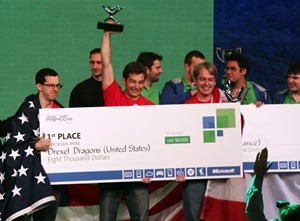Building educational games can pay off! It did for Drexel Dragons
 A simple but well thought out math game that helps kids learn math won the Windows Phone Game Design category at the World finals Imagine Cup 2012
A simple but well thought out math game that helps kids learn math won the Windows Phone Game Design category at the World finals Imagine Cup 2012
Learning through video games is not a new concept, but designing a game that is effective for learning new concepts and still fun to play is easier said than done. Often we think the most difficult part of game design is the graphics or the physics. But not every game requires the complexity and development time of Halo. Puzzle games like Angry Birds and Bejewelled are extremely popular, but aren’t necessarily the most difficult games to create. Sit and brainstorm with a few friends and maybe you can come up with a new puzzle or a new twist on a classic puzzle. MathDash is a great example of a game which accomplishes a lot with simple graphics and a well thought out concept. The game won Drexel Dragons first place at the Imagine Cup 2012 World Finals in Australia in the Windows Phone Game Design category.
MathDash was developed by the team Drexel Dragons from the United States. They decided to try and help kids with basic math concepts by designing a game that makes you want to practice. Traditionally, students learning to solve math problems sit down and memorize common solutions. This approach teaches children there is only one right answer. MathDash allows a player to explore multiple possible solutions, by giving the player a continually changing, limited selection of numbers. The player quickly learns that trying to solve a problem with only a single solution in mind won’t always work. The game encourages players to approach problems from a different perspective, giving them an intellectual advantage by teaching them to think outside the box. At the same time, players of any age can enjoy the simple, engaging gameplay while competing for the highest scores.
The result is more challenging than you would expect. When I first tried the game, I got the equation x + y = 12 and found my brain stymied when I didn’t see two numbers that added up to 12. Then I combined a 6 and 2 to make an 8, then I was able to drag an 8 and 4 to the formula bar to complete the equation. I was impressed, this actually required some brain power!
For now you can download the code but I look forward to seeing this app in the marketplace so I can give it to my kids (who are math geeks but will enjoy the mental challenge of the game). I hope the team builds a version for the Windows 8 marketplace as well, because this game will also work beautifully on a tablet or slate.
Congratulations Drexel Dragons on a great concept and strong execution! With Smartboards in classrooms and touch devices becoming more and more common, educational games are a great market. Parents are more likely to spend money on an app to teach their kids than on a game for themselves. Reading? Geography? Math? French? Russian? Sign language? How would you make learning fun?
Dream it. Build it. Live it!